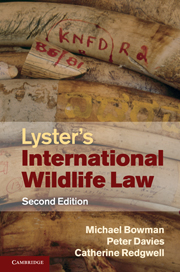Book contents
- Frontmatter
- Contents
- Foreword
- Preface
- List of abbreviations
- PART I Foundations of international wildlife law
- PART II Species regulation
- 5 Fish
- 6 Cetaceans
- 7 Birds
- PART III Regional wildlife regulation
- PART IV Global wildlife regulation
- PART V Biological diversity: a new perspective on wildlife regulation
- PART VI Cross-sectoral issues in wildlife regulation
- PART VII Conclusion
- Index
- References
6 - Cetaceans
Published online by Cambridge University Press: 05 July 2011
- Frontmatter
- Contents
- Foreword
- Preface
- List of abbreviations
- PART I Foundations of international wildlife law
- PART II Species regulation
- 5 Fish
- 6 Cetaceans
- 7 Birds
- PART III Regional wildlife regulation
- PART IV Global wildlife regulation
- PART V Biological diversity: a new perspective on wildlife regulation
- PART VI Cross-sectoral issues in wildlife regulation
- PART VII Conclusion
- Index
- References
Summary
Background
The history of man's depletion of one species of great whale after another is perhaps the most infamous example of human mismanagement of the Earth's natural resources. As early as the thirteenth century, Basque whalers had so overexploited right whales (Eubalaena glacialis) in the Bay of Biscay that they were forced to look further afield for their prey. Since then, the whaling industry has proceeded in a series of booms and slumps as the discovery of new whaling techniques and new whaling grounds has been invariably followed by rapid depletion of one population after another. Great whales and whalers now survive in numbers which are a small fraction of their former abundance, and the commercial whaling industry, which once employed over 70,000 people in the USA alone, is almost non-existent.
The need for international co-operation in preventing their overexploitation is self-evident since so many whales inhabit waters beyond national jurisdiction. Nonetheless, it was not until 1931 that the first whaling treaty, the Convention for the Regulation of Whaling, was concluded. The 1931 Convention went some way towards controlling the worst whaling practices, but it only scratched the surface of the real problem. It prohibited commercial hunting of right whales, and tried to prevent excessive wastage of other species by requiring whalers to make full use of all carcasses and by banning the killing of calves or suckling whales, immatures and female whales which were accompanied by calves or sucklings.
- Type
- Chapter
- Information
- Lyster's International Wildlife Law , pp. 150 - 198Publisher: Cambridge University PressPrint publication year: 2010



